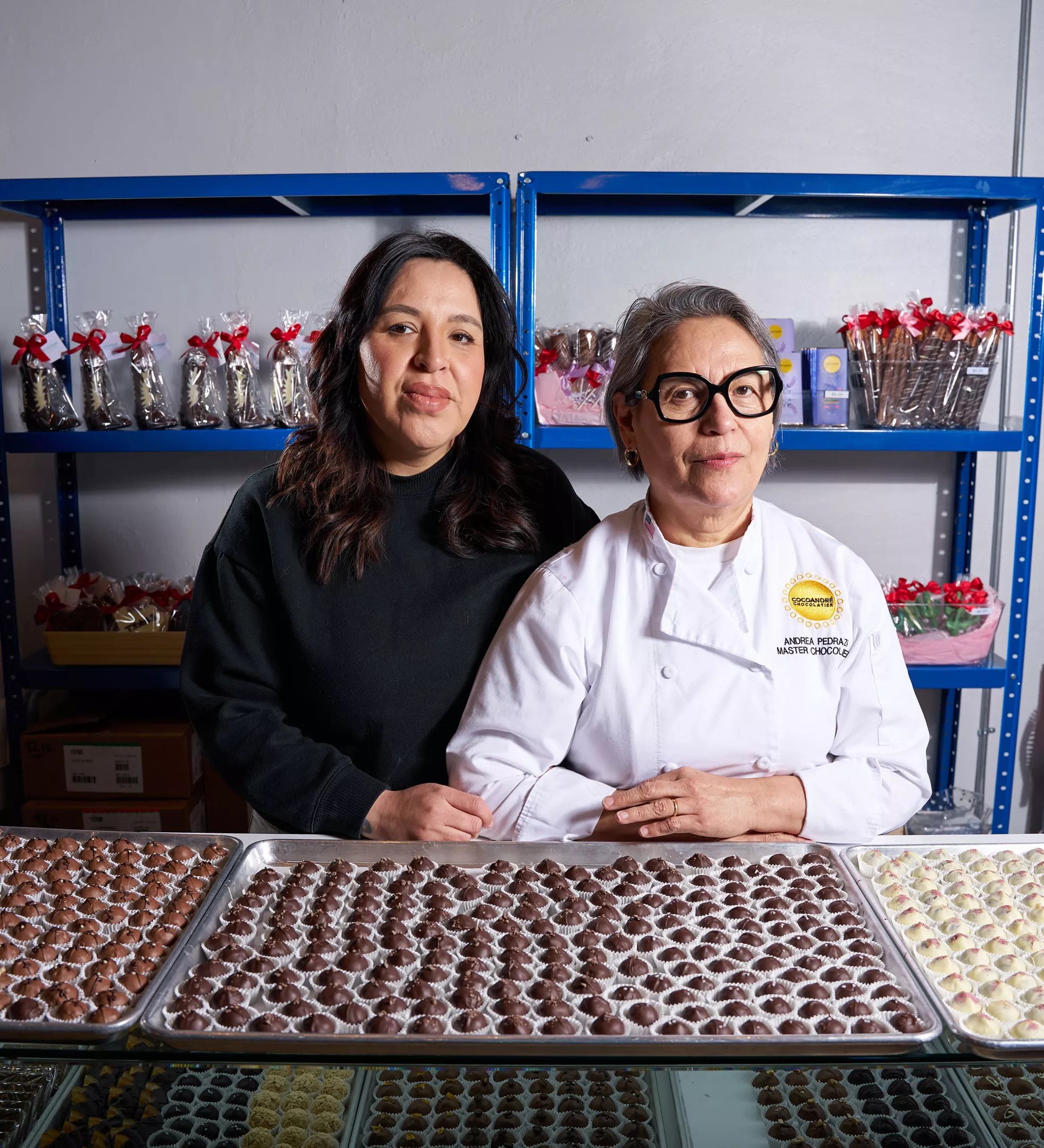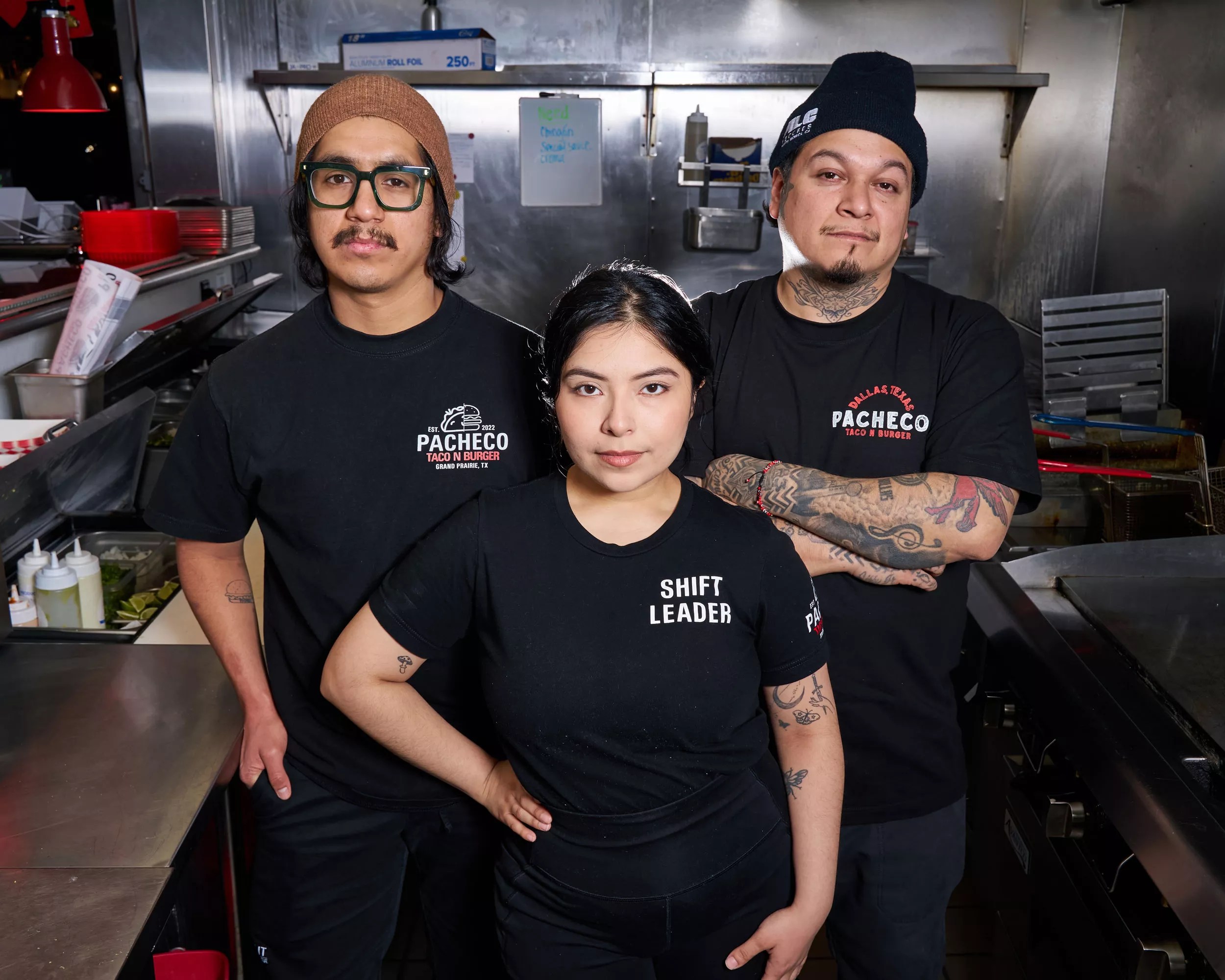
Alison McLean

Audio By Carbonatix
“When I was a kid, I remember my mom and my dad always knew that deportation was a possibility before they became citizens,” Cindy Pedraza recalls, her voice shaky as she reflects on her parent’s journey from a small desert town in Mexico to the United States. “My mom had a babysitter, and she had to trust that the babysitter could keep me until she could get back to me, you know?”
Decades later, Pedraza, co-owner of CocoAndré Chocolatier, now watches as the same fears she and her family experienced not too long ago return, only this time for many others.
“It’s really hard to think that people are thinking like that again,” she says, breaking down into tears.
The Trump administration’s new immigration orders have brought mass deportations, protests and ICE raids into the public eye like never before. In Texas, where approximately 1.6 million unauthorized immigrants live, the second-highest number in the U.S., such changes are monumental.
“These people are going to be gone – these are people that are family, friends, employees,” Cindy said. “How do you fix a country when there’s going to be so many voids all over the United States?”
Amid these drastic shifts, three immigrant-owned businesses in Dallas all said the same: people are scared.
CocoAndré Chocolatier
CocoAndré is a Mexican-American chocolate shop in Dallas that combines traditional European techniques with Mexican flavors to create a unique chocolate experience. Cindy runs CocoAndré alongside her mother, Andrea Pedraza, who immigrated to the U.S. in her 20s to seek a better life.
Andrea worked as a seamstress for 14 years before becoming a chocolatier. She quickly became head of production at a local chocolate company, and after 25 years there, opened CocoAndré with her daughter. The duo has been at it for 15 years, forging strong, vibrant connections with their Dallas community.
When asked how people are feeling about the recent immigration changes, though, Cindy’s mood changed.
“It’s just so much fear right now,” she said. “And you’re trying not to project it onto your kids and to your staff, but we’re scared.”
For many, uncertainty surrounding Trump’s new immigration policies and their ultimate outcomes fuels this widespread fear.
“That’s really the biggest impediment to understanding how this is going to affect the economy,” said Pia Orrenius, a senior labor economist at the Federal Reserve Bank of Dallas and expert on Mexico-U.S. migration. “We don’t know really on what scale this is going to be executed.”
Since returning to office, Trump has implemented sweeping immigration reforms, from deploying armed forces at the border to restricting refugee admissions and penalizing sanctuary jurisdictions. His administration has also rescinded dozens of Biden-era policies, marking one of the most significant shifts in U.S. immigration policy in recent history.
Orrenius notes that it’s difficult to determine whether these policy changes signal a fundamental shift or merely a course correction, considering the high volume of individuals allowed entry during the previous administration.
“I mean, it’s a big deal,” she said. “But what happened under the Biden administration was also a huge deal. We’ve never seen anything like that. And now, obviously, there has to be some normalization.”
Why It Matters
With foreign-born workers accounting for 22.2% of Texas’ labor force – 8% of whom are unauthorized – new immigration policies could leave critical industries like construction, agriculture and hospitality vulnerable.
Rachel Moran, a law professor at Texas A&M University, says that cities like Dallas, which rely heavily on immigrant labor, could feel the effects most.
“Labor shortages could have broader impacts on the population,” she said. “An increase in construction costs could delay or eliminate projects. This is a particularly important consequence, given that Dallas has been growing rapidly. Building homes, offices and other facilities will be key to ensuring a high quality of life.”
Moran says heightened enforcement fears could push many Dallas immigrant entrepreneurs to shut down or leave their businesses altogether.
“Immigrants’ businesses often cater to clientele in immigrant communities,” she said. “If customers become afraid to patronize local businesses or decide to relocate, there could be a serious hit to the bottom line.”
Orrenius also points out that while fewer immigrants may alleviate job competition in some sectors, the overall economic consequences could be negative, citing research on the effect of past mass deportations in communities that saw significant immigrant departures.
“In those local areas, actually, they had less job growth, and less businesses did well,” she says. “If you deport a lot of people, you’re losing not just workers, you’re also losing consumers, and consumers add aggregate demand.”
Even though they are all fully documented American citizens, the Pedraza family knows ICE could still target them at any moment.
“It’s going back to that mindset where you are trying to teach your family and friends how to protect themselves,” Cindy says.
They’ve already started taking precautions, such as printing citizenship cards and carrying passports everywhere they go. Cindy even stored her daughter’s passport on her daughter’s phone, just in case.
“She’s 11,” she said. “She shouldn’t have to worry about or even know or deal with that kind of thought.”
A letter from her daughter’s school also reassured parents that the school “won’t open their doors to ICE” nor “let them come in and hurt our children and staff.”
“I never thought I would read this,” Pedraza said. “This is a principal [of a school] that gets government money, and they have to worry about, like, ‘Am I going to be responsible for this child not making it home?'”
Pedraza said if things don’t get better in the next five years, she won’t want to continue the family business.
“I’m stressed,” she said. “Prices are going up. Now, they’re trying to cover programs that help small businesses. It’s like everything is just snowballing.”
She’s not alone in this concern, either. Moran noted that small immigrant-owned businesses often struggle to survive downturns because of limited capital and slim profit margins. If conditions don’t improve, CocoAndré won’t be the only one at risk of shutting down.

Alfonso Vera immigrated to Dallas from Mexico and first worked at a Neiman Marcus bakery before opening Vera’s Bakery.
Alison McLean
Vera’s Bakery
“It will have an effect on us tremendously,” said Elda Vera-Alvarado of Vera’s Bakery regarding the recent immigration policy changes.
Vera’s Bakery is a beloved family-owned business that has been a cornerstone in the Dallas community for 30 years. Led by Alfonso Vera and his three daughters, Elda, Naomi and Rosanna, the bakery serves a variety of masterfully crafted Mexican pan dulce (sweet breads), doughnuts and custom cakes.
According to Elda, 90% of their customers come from Mexican, Hispanic and Latino backgrounds. She says they’re afraid.
“Customers that come in and stop by on a daily basis – before work or after school pickups – have mentioned it to us,” Elda said. “We can see it. They’re worried. I mean, I would be too. Anybody would be in that situation.”
Vera’s Bakery started with Alfonso, who immigrated from Mexico to Dallas and initially worked at a Neiman Marcus bakery. After it was bought out, Alfonso saw an opportunity to branch out on his own.
“It was his very first business,” Elda says. “He probably didn’t know what he was going to be getting into or how long it was going to last or all that, but we were blessed for that opportunity.”
Alfonso purchased a local Mexican bakery. He combined his expertise in creating gourmet American cakes with the traditional Mexican pan dulce recipes he learned from an employee at the original bakery.
With the help of their family, Alfonso and his wife, Julia, opened Vera’s Bakery on West Davis Street in Oak Cliff, turning his passion into the adored business it is today. Since 1995, Vera’s Bakery has grown alongside its Dallas community. The Vera family has been a part of countless milestones.
“They’ve ordered cakes for marriages, they’ve ordered their baby shower cakes, birthday cakes, you know, all of that,” Elda says. “We have longtime customers, and we have that relationship. And to see that separation, it’s just heartbreaking.”
But while some immigrant-owned businesses in Dallas are experiencing shifts in their communities and customer bases because of policy changes, others, like Pacheco Taco N Burger, are struggling with something more urgent: their employees no longer showing up to work.

From left to right: Adan Pacheco, Jennie Garcia, and Gilbert Villalon at Pacheco Taco N Burger have noticed more fear and a decline in employee availability.
Alison McLean
Pacheco Taco N Burger
Cecilia Ramirez immigrated from Mexico to the U.S. in the late 1980s. After a life working in the service industry she proposed the idea for a burger and taco pop-up to her son Adan Pacheco just a few years ago.
“I think she was about 55 at the time, and she was like, ‘Let’s start something now. I’m only getting older,'” Pacheco said.
Now, they make crave-worthy comfort foods like burgers, tacos, tortas, quesadillas and carne asada fries inside Four Corners Brewing Company’s taproom in Dallas.
Jennie Garcia, who works at Pacheco, has noticed a decline in employee availability and reliability.
“They’re afraid they may be taken away from their families,” she says. “There’s a lot of anger that comes with all these different laws coming about. It’s just, it’s a scary … it’s a very scary moment.”
“To the extent that entrepreneurs or employees are undocumented or have family members who are undocumented, there may be increased fears about arrest, detention, deportation and family separations,” Moran at Texas A&M says. “Employees may quit because they want to avoid detection or have decided to leave the United States voluntarily.”
Moran warns that policy changes will hit small businesses and the communities they serve particularly hard.
“Immigrants to the United States have a high rate of entrepreneurship,” Moran explains. “Due to limited access to capital, these entrepreneurs start small businesses by drawing on personal savings as well as loans from family and friends.”
The mother-son pair poured their entire life savings into the business, putting everything they had into its success.
“My mom – she’s the hardest worker I know,” Pacheco said. “So as long as we put the work in, we were gonna make it work no matter what happened.”
They’ve taken Pacheco Taco N Burger from food truck to pop-ups, then to a convenience store, and now, as they enter their third year of business this May, they’ve found a home at Four Corners Brewery. Pacheco emphasized that this wouldn’t have been possible without his parents’ immigrating to the U.S.
“We wouldn’t be here,” Pacheco said. “We wouldn’t be having the opportunities we have now.”
These immigrant-owned businesses and others alike have defied the odds to get to where they are today. But the recent surge in immigration enforcement threatens everything – their businesses, their communities, their families, their livelihoods.
“You don’t know what’s real, what’s not, how to help,” Cindy Pedraza of CocoAndré Chocolatier said. “It feels like the walls are kind of falling down everywhere you go.”